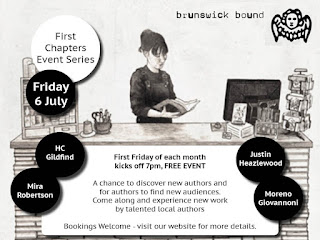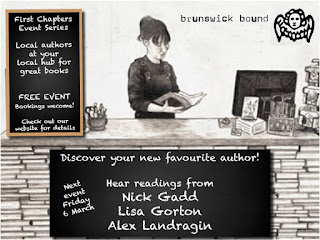First Chapters Q&A with Miriam Sved
Miriam Sved is an editor and the writer of Game Day and A Universe of Sufficient Size. Her novella All the Things I Should've Given was a winner of Griffith Review's 2018 Novella Project, and her short fiction has been widely published including in Best Australian Stories, Meanjin and Overland. She has also been a contributing editor on three feminist anthologies, published by Picador/Pan Macmillan: #MeToo: Stories from the Australian movement, Mothers & Others: Australian writers on why not all women are mothers and not all mothers are the same and Just Between Us: Australian writers tell the truth about female friendship.
Miriam will be reading rom A Universe of Sufficient Size at First Chapters on Friday 1 November.
1.
Brunswick Bound has asked you to read a piece from your published work.
Tell us what we can expect from the piece you have chosen?
The
piece I’m reading is from the beginning of my novel A Universe of Sufficient Size. Moving between Brooklyn in 1950 and
Sydney in 2007, it introduces three generations of one family, a mysterious mathematical
problem and a handwritten Hungarian notebook that’s the catalyst for the
novel’s events.
2.
How would you describe the kind of books that you write?
Heartbreaking
works of staggering genius?
I
aim to write compelling human stories, character-driven with interesting ideas
underlying them and a few twisty-turny plot elements. I’m generally a realist
author, and A Universe of Sufficient Size
is my first foray into historical fiction.
3.
What was the first book that you read (or had read to you) that left an
impression on you?
There
are picture books I still remember almost word for word (so much and no more, never more than a spot, or something may happen,
you never know what!). So they clearly left an impression on some neural
level. The first books that really hooked me into reading were the god-awful Flowers in the Attic books by Virginia
Andrews. I read them when I was nine and probably did myself some psychic damage,
but they were a gateway drug into reading.
4.
Do you believe that books should answer life’s big questions?
No,
I think that’s asking books to do the wrong sort of work. Interesting books
explore big questions or pose them in illuminating ways, letting the light in
via different angles, but providing straightforward answers is usually too
reductive for a novel. I also think one of the great pleasures of reading can
be forgetting about life’s big questions, at least on a conscious level.
5.
Do you have any writing quirks?
I
write my first drafts longhand, I have the worst handwriting of anyone I know
and I find it quite comforting, it helps me to know that no one who stumbles
across those first draft words would be able to read them. (A friend who fancies
himself a handwriting expert had a sample page pinned to his fridge for six
months and only deciphered a few words).
It
also helps me to have a dog in the room.
6. What is your favourite word or phrase?
The
tip of the tongue taking a trip of three steps down the palate to tap, at
three, on the teeth.
7.
What have you found most surprising about publishing a book?
Just
how much goes into it: the editing process alone – it took about 18 months and
three terrific editors to get A Universe of Sufficient Size from initial submission to print. And the design
process, the publicity. The hardest part of the whole thing is writing the
acknowledgements because I’m scared of not doing justice to so many excellent
people involved at so many stages.
8.
What is the question that you hope never to be asked in an author Q&A?
Anything
related to the maths in my novel.
9.
What question do you hope you will be asked and why?
I
like being asked about the editing process. It’s such a huge part of the
finished product of a novel, but invisible if it’s done well, and I’m in awe of
good editors. It’s also just a weird and surprising process, the kind of
editing that writers do to get a first draft into shape: endless hard slog sprinkled
with a few magical moments when things seem to slip neatly into place.
10.
Which author that you have read do you think should be better known or more
widely read?
Christie
Nieman, a wonderful Australian writer of YA and adult fiction and nonfiction.
Find out more about the First Chapters event series on the Brunswick Bound website.





Comments
Post a Comment